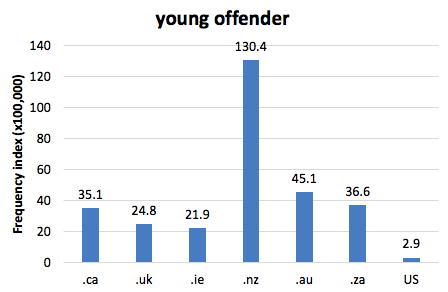DCHP-2
young offender DCHP-2 (December 2016)
n. — Law
a criminal under the age of majority.
Type: 1. Origin — The legal definition of the term young offender has changed with different youth criminal acts that have been in effect in Canada. The age range of 10-17 is given by the current Youth Criminal Justice Act, passed in 2003, which replaced the earlier Canadian Young Offenders Act, which defined a young offender as between the ages of 12-17. The Young Offenders Act was passed in 1984, and replaced the Juvenile Delinquents Act, which itself was implemented in 1908 but did not have a nation-wide age restriction. Until 1984 provinces had different age limits in effect, but most had a limit starting at 12 and inclusive of 16, 17 or 18. See also Maple Leaf Web reference. As Chart 1 shows, the term is widespread, especially in New Zealand, but in the North American context shows a Canadian dimension.
COD-2, s.v. "young offender", defines the term as "(in Canada)".References:
- COD-2
- Maple Leaf Web "Youth Justice in Canada: History & Debates" Accessed 22 Aug. 2013
Images:

Chart 1: Internet Domain Search, 4 Aug. 2016